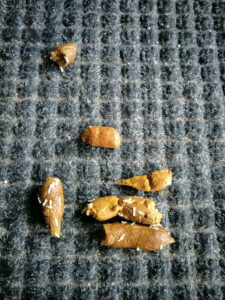Do you know how to treat worms in dogs?
Do you know how to detect them?
This article gives pet parents specific things to look for and what to do if you see them.
Continue reading if you’d like to learn about worms and some interesting facts about these gnarly little creatures…
Note: Grooming salons, boarding kennels and doggy daycares need to be extra vigilant about having great cleaning protocols to help prevent worms from being transmitted from one dog to another.
Cats can ALSO get worms so if you have a kitty or adopt, please ask you veterinarian to see if your feline friend needs de-wormed.
Fact #1
Worms affect most dogs at various points in their lives.
Fact #2
Some worms can affect people, especially children and individuals with compromised immune systems.
Fact #3
Dog worms usually won’t go away on their own and some can KILL your dog if not treated in time.
Fact #4
Treating worms in dogs might take multiple attempts, one pill or treatment might not take care of the problem and it’s best to consult a veterinarian before treating any type of worm your dog may have.

If you zoom in on the picture above you can see small white objects, those are segments of tapeworms. The dog also had tapeworm segments around his bottom after he pooped. The worms were moving and we contacted his dad immediately after our pet sitting visit.
How Dog Worms Can Infect Children and Adults
Children and adults can contract roundworms easily if they have any open wounds on their feet, and they step barefoot on feces containing worms.
If children (or adults) pick up dog toys or other items that were on the ground where dogs have pooped and then place their hands in their mouth or rub their eyes may unknowingly ingest worm larvae or worms.
Once inside the body, the worms can travel to the brain, via the liver, lungs and eyes so it’s very important to keep dog waste removed from areas where children play.
sit-stay-play provides poop scooping services for dog parents and we can also clean cat litter boxes, bird cages and kennels. Scheduling is easy and services are affordable.
Tapeworms can be contracted by dogs, adults and children by swallowing an infected flea.
Tapeworms can cause liver disease in people.

Typical Types of Worms Dogs Can Get
- Roundworm
- Tapeworm
- Hookworm
- Whipworm
- Heartworm
- Ringworm (actually is a fungal infection)
Click here to schedule your poop scooping services to help keep your yard poop (and worm) free!
How Dogs Contract Worms
- By eating dog fecal matter;
- By stepping on dog poop and getting the fecal matter into an open wound on a foot or other body part;
- By licking toys, other dogs or their own body that have larvae or worms on it;
- By ingesting fleas which carry tapeworm;
- Mosquitos transmit heartworm; and
- roundworms are passed from mom to puppy so it’s important to deworm puppies at the age your veterinarian recommends; and
- Ringworm is transmitted by direct contact.
What Worms Look Like
- Roundworms look like off-white pieces of spaghetti and can get up to 8″ in length.
- Tapeworms look like little pieces of rice and sit on the stool or stick to the hair near the dog’s anus.
- Tapeworm isn’t actually one worm, the worms are actually small segments attached together. The individual segments have the tapeworm eggs.
- Hookworms look like roundworm but have teeth and they move around about 6 times a day to find new feeding spots.
- Whipworms can be seen under a microscope.
- Ringworm looks like a small red rash – ringworm is very contagious to other pets and people!
How to Treat Worms in Dogs
Veterinarians prescribe liquid worming medicine or administer a worming pill for roundworm, tapeworm, whipworm and hookworm.
Heartworms are treated via a monthly pill.
Ringworm is treated via a sulfur dip prescribed by a veterinarian.
If you think your dog has worms, call your veterinarian immediately and follow their instructions. Some will want you to bring in a stool sample for accurate diagnosis.
Puppies are highly susceptible to worms and puppy parents need to be vigilant about treating these youngsters or anemia and serious illness and death can occur.
Cleaning Areas Affected by Worms
It’s very important to clean any area that a dog with worms has been in and to remove ALL fecal matter from the yard or living area.
Carpets should be vacuumed, floors should be swept and mopped, ESPECIALLY if the dog has had bowel movements on the flooring.
Outside kennel runs should be cleared of fecal matter, swept, cleaned and disinfected with a product specifically made to kill virus, worms and other pathogens.
Wash your hands thoroughly after cleaning these areas.
Children playing outside in areas frequented by dogs should wash their hands after playing and their feet if they’ve been barefoot.
Early Prevention
Before adopting a new dog, make sure they’ve been wormed. If the puppy or dog hasn’t been wormed, have your veterinarian check and you can inspect the fecal matter to see if you notice any of these types of worms. But remember, you might not be able to detect them so a vet check is important.
If you’ve adopted a new dog and he seems to be losing weight or showing other symptoms such as lethargy, constant eating, vomiting or diarrhea, have your veterinarian check him out for worms, viruses or parasites.
Note: Parvovirus and certain types of worms can live in soil for months and even years, regardless of weather.
Talk to your veterinarian about how to treat the ground, grass and soil if your dog has parvovirus or worms that can live in the soil.
sit-stay-play can provide pet taxi services if you need to take your dog to the veterinarian and don’t have transportation.
As professional pet sitters and groomers, we monitor the pets in our care and check their, ehh hmmm, ‘deposits’ to make sure we don’t notice any worms or other foreign material. If we do notice something in their stool, we’ll inform you immediately. If a pet comes in for grooming and we see evidence of worms, we’ll contact you for immediate pick up.
Contact us here to schedule poop scooping services or to schedule a PET TAXI.
Kelley Stewart | Founder & President
sit-stay-play In-home pet sitting & more.inc
“Your pet sitting, dog walking, poop scooping specialists!”
Serving Muncie and east central Indiana
P.S. Looking for a professional pet groomer? Our salon, Muncie Pet Grooming, is taking new clients. Request an appointment today!
P.P.S. Are you looking for a veterinarian in or near Muncie? Hop on over to this page to see the top 3 recommendations our clients give.
Reference: http://www.dogbreedinfo.com/worms.htm

